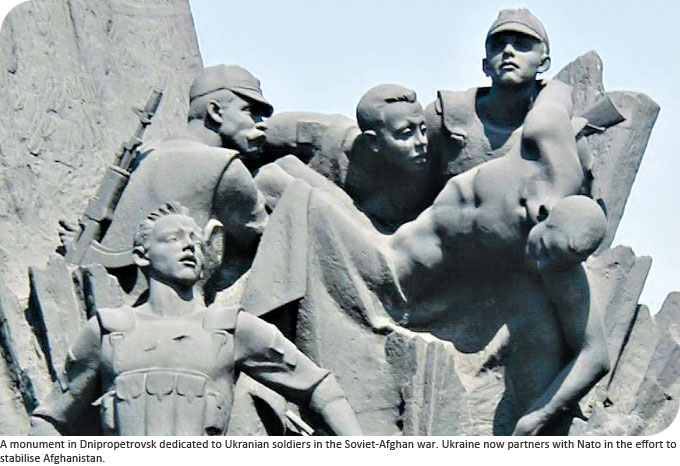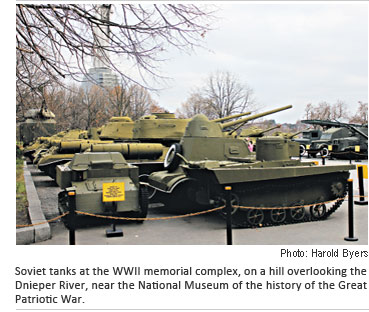
 kraine’s relationship with NATO formally got underway immediately following its independence from the Soviet Union in 1991. At that time more than 90 percent of Ukrainians participating in the referendum made their choice for self-government. kraine’s relationship with NATO formally got underway immediately following its independence from the Soviet Union in 1991. At that time more than 90 percent of Ukrainians participating in the referendum made their choice for self-government.
Nearly 20 years later, public opinion again has a bearing on the future of Ukraine, as President Viktor Yanukovych, citing public sentiment against joining the alliance, put the brakes on his nation’s drive to become a full member of NATO.
Yanukovych, who was elected in February, 2010, has exempted his country from membership in any and all military alliances, which includes Moscow’s invitation to join the Russia-led Collective Security Treaty Organization, along with Armenia and Commonwealth of Independent States (CIS) partners Belarus, Kazakhstan, Kyrgyzstan, Russia and Tajikistan.
Such an approach is a 180-degree turnabout from that of his predecessor and is more in accordance with what, opinion polls reveal, the Ukrainian people want.
The formal basis for NATO-Ukraine relations lies in the 1997 Charter on a Distinctive Partnership. During both the fourth and fifth periods of NATO enlargement in 1999 and 2004, no less than10 Central and East European nations ascended to full membership status. Well before that time, Ukraine had signed on to the Euro-Atlantic Partnership Council (formerly the North Atlantic Cooperation Council) becoming the first CIS nation to be a signatory to the Partnership for Peace (PfP) program.
The Yanukovych government’s decision does not mean, however, that key areas of cooperation between Europe’s second largest nation and the 28-member alliance no longer exist.
 In November of 2010 the government in Kyiv announced the creation of a special commission, headed by Ukrainian Foreign Minister Kostyantyn Gryshchenko, charged with directing the continuation of the effective partnership that has long existed between Ukraine and NATO. In November of 2010 the government in Kyiv announced the creation of a special commission, headed by Ukrainian Foreign Minister Kostyantyn Gryshchenko, charged with directing the continuation of the effective partnership that has long existed between Ukraine and NATO.
Just as Kyiv lent its support to peacekeeping operations in the Balkans in the mid-to-late 1990s, Ukrainian defense officials are determined to continue assisting the alliance, and have expressed their willingness to participate in the proposed NATO missile shield, deemed a top priority of the organization during its November summit in Lisbon.
“Ukraine has not only expressed the readiness to take part in the creation of the European missile defense system but has also offered to use its radar stations in the project,” said a top advisor to President Yanukovych during a November 23 meeting with the chief of the Polish National Security Bureau.
Ukraine’s track record in actively contributing to Euro-Atlantic security through the deployment of troops working in concert with peacekeepers from NATO and other PfP countries is second to none. Currently it is the only PfP country actively engaged in the four major, ongoing, NATO-led operations and missions in Bosnia-Herzegovina, Kosovo, Iraq and Afghanistan.
Along with these peace-support operations, Ukraine and NATO cooperation has been centered on defense and security sector reform, military-to-military cooperation issues, armaments, civil emergency planning, science and environment, and public information.
Of these, reform of the defense and security sector has been the most significant, with an overarching goal of strengthening democratic and civilian control of Ukraine’s armed forces and security institutions.
Such cooperative efforts have been farther reaching than those NATO has undertaken with other partnering countries and, according to the alliance, have been “crucial to the ongoing transformation of Ukraine’s security posture and remains an essential part of its democratic transition.”
In particular, Ukraine faced the daunting task of seeing through a complete overhaul of its armed forces, after having inherited its share of a Soviet-era conscript army – one of the largest in history – to that of a smaller, leaner, professional fighting force offering greater mobility.
In short – the nation of Ukraine found the political will to reform its military, ensuring not only the effective protection of its sovereignty, but giving it the ability to make a significant contribution to global and regional security.
Nonetheless, the change in direction in regards to NATO accession, undertaken by President Yanukovych, is bolstered by public sentiment. A 2009 survey by the Pew Research Center’s Global Attitudes Project showed that slightly more than half (51 percent) of Ukrainians were against full membership in the alliance, while 28 percent were in favor.
How one considers Ukrainian membership in NATO differs by ethnicity and region. According to Pew, ethnic Russians (74 percent) were far more likely to oppose admission to NATO than ethnic Ukrainians (46 percent). In terms of regional groupings, respondents living in the East (72 percent) and South (60 percent) – where the percentage of Russians tends to be higher than elsewhere in the country – were more likely to oppose joining NATO than were those living in the Central region (51 percent). And in the West a majority (59 percent) favored their country becoming part of NATO.
Within the alliance, public opinion towards Ukrainian accession is strikingly positive in a number of countries, including 64 percent approval in Poland, 58 percent in Lithuania, 54 percent in France, and nearly 50 percent in Bulgaria, Czech Republic, and Spain.
A fair share of this support can likely be explained by the level of familiarity various nations have in working alongside Ukrainians in NATO peacekeeping missions. For instance, in addition to a Ukrainian helicopter squadron, several infantry companies, and headquarters’ support staff, approximately 180 Ukrainian military personnel serve in a joint Polish-Ukrainian battalion in Kosovo. Ukrainian medical personnel have supported the Lithuanian-led Provincial Reconstruction Team in central Afghanistan since 2007.
In Bosnia-Herzegovina the Ukrainian military plays an important role in the NATO mission by way of its supplying an infantry battalion, a mechanized infantry battalion, and a helicopter squadron. The nation’s strategic airlift capabilities have been put at-the-ready, and its naval assets have been deployed to the Mediterranean in support of NATO maritime anti-terror operations. Also, since 2005, Ukraine has been the only PfP country to provide personnel to the NATO Training Mission in Iraq.
A central problem then, for both the perception of the North Atlantic Treaty Organization in Ukraine, and the way Ukraine is perceived within the alliance, is the politics of identity. According to UK Ambassador to Ukraine Leigh Turner, it’s not at all surprising that after decades as part of the Soviet Union, people in Ukraine “don’t fully understand what kind of things NATO does, and the fact that it is much more than a military alliance.”
Where Ukraine has worked in concert with NATO member states, such as with Poland and Lithuania, relationships have been more convivial. According to Ambassador Turner, “It's striking, for example, that many of the countries which are now in NATO were formerly in the Warsaw Pact. And nothing disastrous or dramatic has happened to those countries. They enjoy democratic systems, they enjoy successful economies, and I think that shows that there's nothing to be afraid of in joining NATO.”
Whether or not Ukraine will once more aspire to full NATO membership, the special relationship that the nation has with the organization will remain central to each other’s strategic interests, and, according to US Ambassador to Ukraine John Tefft, “While Ukraine’s leaders have chosen not to seek membership in NATO at this time... they know the door remains open.”
|